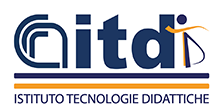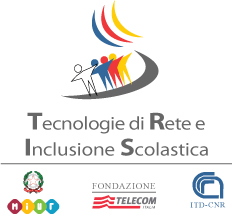Aims
The TRIS (Tecnologie di Rete e Inclusione Socio-educativa; Network Technologies and Socio-educational Inclusion) project, an agreement entered into by ITD-CNR and the Telecom Italia Foundation, is the operational development of the framework agreement between MIUR (Italian Ministry of University and Research), CNR (National Research Council) and the Telecom Italia Foundation for promoting an experiment on the educational inclusion of students who have difficulty in attending school regularly due to specific invalidating illnesses or social problems.
The aim of the agreement is to seek out and experiment new educational models for students who are either temporarily or permanently unable to follow normal educational paths due to psycho-physical problems (e.g. emotional or neuropsychiatric disorders), long-term hospitalization, particular treatment programmes (e.g. multiple chemical sensitivity), or particularly disadvantaged geographical situations (e.g. students residing in small islands or mountain areas).
These models will feature regular and methodical use of the new information and communication technologies, both in the normal teaching and learning processes, and in teacher interaction.
Major Activities
Five pilots are to be run in the Campania, Lazio and Sardinia regions. Each will feature a different situation of educational disadvantage posing temporary impediments to regular school attendance.
The main activities envisaged are:
- design and implementation of the pilots, each following a specific methodological approach and adopting a particular set of technologies;
- coordination of experimental activities and support for the teachers involved, both onsite and online;
- devising experimental protocols for monitoring the impact of digital technologies on learning processes, on the level of students’ social-educational inclusion, and on communication with the school communities involved (learners, teachers, parents, social/health staff, etc.);
- design and implementation of the online environment supporting interaction within the respective communities;
- monitoring of the pilots and scientific analysis of the data collected;
- planning and deploying training for teachers involved in the pilots, covering both methodological and technological aspects of pilot activities. This training will be deliverable both in blended and onsite modes;
- disseminating of results.
Expected results
- affected students - acceptance and full integration into learning activities and class life by redressing prejudices and fostering collaborative learning;
- school communities – closer interaction among class teachers, nurturing of a self-help network (parents, friends, volunteers) promoting educational inclusion, closer links with local community and organisations; triggering of mutual/informal learning processes within the online community (educators, researchers, sociologists, welfare staff).
 Italiano (Italia)
Italiano (Italia)  English (United Kingdom)
English (United Kingdom) 

